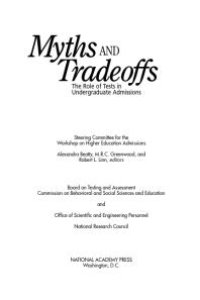
Ebook: Myths and Tradeoffs: The Role of Tests in Undergraduate Admissions
Author: National Research Council, Division of Behavioral and Social Sciences and Education, Board on Testing and Assessment, Steering Committee for the Workshop on Higher Education Admissions, Robert L. Linn, M. R. C. Greenwood, Alexandra Beatty, Robert L. Linn
- Tags: Universities and colleges -- United States -- Entrance examinations., Universities and colleges -- United States -- Admission., Educational tests and measurements -- United States., SAT (Educational test), ACT Assessment., EDU030000, EDU030000, NON000000
- Year: 1999
- Publisher: National Academies Press
- City: Washington, D.C., United States
- Edition: 1
- Language: English
- epub
More than 8 million students enrolled in 4-year, degree-granting postsecondary institutions in the United States in 1996. The multifaceted system through which these students applied to and were selected by the approximately 2,240 institutions in which they enrolled is complex, to say the least; for students, parents, and advisers, it is often stressful and sometimes bewildering. This process raises important questions about the social goals that underlie the sorting of students, and it has been the subject of considerable controversy. The role of standardized tests in this sorting process has been one of the principal flashpoints in discussions of its fairness. Tests have been cited as the chief evidence of unfairness in lawsuits over admissions decisions, criticized as biased against minorities and women, and blamed for the fierce competitiveness of the process. Yet tests have also been praised for their value in providing a common yardstick for comparing students from diverse schools with different grading standards. Myths and Tradeoffs identifies and corrects some persistent myths about standardized admissions tests and highlight some of the specific tradeoffs that decisions about the uses of tests entail; presents conclusions and recommendations about the role of tests in college admissions; and lays out several issues about which information would clearly help decision makers, but about which the existing data are either insufficient or need synthesis and interpretation. This report will benefit a broad audience of college and university officials, state and other officials and lawmakers, and others who are wrestling with decisions about admissions policies, definitions of merit, legal actions, and other issues.
Download the book Myths and Tradeoffs: The Role of Tests in Undergraduate Admissions for free or read online
Continue reading on any device:

Last viewed books
Related books
{related-news}
Comments (0)